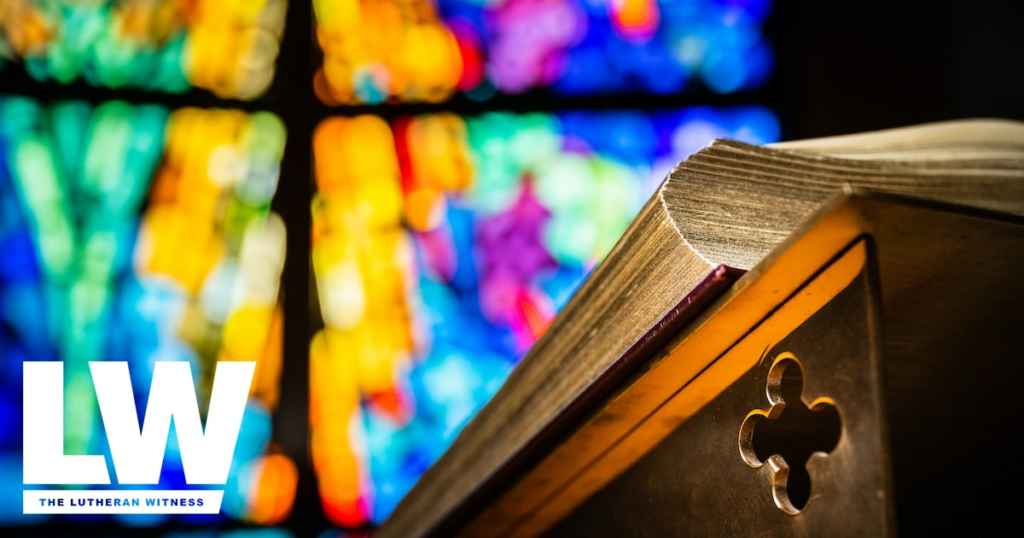by Rev. Brian Saunders
Helpful definitions
A recent USA Today article, published May 16, 2011, by Oliver Thomas entitled “Faith in America: Get Ready for Change” forewarns the Church that “change” is on the way. That is no surprise to the holy Christian Church since “change” is at the heart of her confession. The change Thomas is offering, however, is not the same as the change of the historic Church. Instead, he suggests that the Church needs to change what she believes, teaches and practices. In other words, she needs to change everything.
It is helpful here to define what is meant by change. Change in the holy Christian Church is about repentance. Repentance is change that takes place in the heart and life of the convicted sinner, not the organism called the Church. Repentant change in the Church occurs when the perfect Law of God confronts the wayward and erring soul, bringing the unrighteous to his knees in confession of his sins. The Holy Gospel then rescues the broken soul with the promise of forgiveness in Christ Jesus. At the same time, it creates faith that receives God’s forgiveness. Thus, it is truly change. In short, the change is not in the Church and its creed but in the heart of the sinner whose life is now lead by love for God and for neighbor.
The Church is also, by its very nature, creedal. So, to change a creed means the essence of the organism itself has changed. To change the essence of an organism is to change the organism itself. The consequence of that kind of change is that the organism ceases to exist.
In other words, to change the creed of the Church is not only to change the Church, but it is to speak of no Church at all. Without the creeds, we are left to our own fallible and erring whims for truth. That is why the authors of the Epitome in the Book of Concord write:
“Immediately after the time of the Apostles–in fact, already during their lifetime–false teachers and heretics invaded the church. Against these the ancient church formulated symbols (explicit confessions) which were accepted as the unanimous, catholic, Christian faith and confessions of the orthodox and true church, namely, the Apostles’ Creed, the Nicene Creed, and the Athanasian Creed. We pledge ourselves to these, and we hereby reject all heresies and teachings which have been introduced into the church of God contrary to them” (Tappert, 465:3).
Holes in the argument
A few points in the article in particular are worth discussing. First, it is interesting that Thomas points out that the populace today is more attuned to a God who is a “big God and is unbound by Scripture or learned scholars.” And yet, shortly thereafter, he leans on the wealth of knowledge of these “scholars” to discredit the apostleship authority and the hierarchical structure that has formed the current governance in the Church.
Apart from Scripture, we have no way of knowing the Son of God who reveals to us the will of God the Father. While He may be larger than creation, creation cannot believe in Him apart from the Word in which He reveals Himself. That means Thomas is simply in error when he says the Early Church had no clergy structure.
In fact, Paul instructed Timothy and Titus to appoint elders (clergy) in the local parishes where they served as overseers. As such, already in the time of Paul, the Church had formal structure. The Church was also growing, and the larger the group the more necessary it was that there be an organized structure for the sake of maintaining a faithfulness to a common confession and practice. The same is true today.
Next, Thomas makes the argument that the Church will become more counter-cultural. This, too, is no new thing, nor is it surprising. The Church is itself a culture that is in this world but not of it. She has her own language, music, relationships and disposition toward the lost. She addresses the lost with the Gospel (her unique language) that the Holy Spirit may have the venue to bring the erring heart to repentance and faith. The Church has never asked the lost world what it would like her to be based on its opinion of truth. Only the Church has the divinely-revealed truth to offer to mankind. Only she can communicate and bestow that truth upon the repentant sinner.
The Church’s response
Thomas affirms that the change that the Church needs to embrace is “loosey-goosey.” The silliness of that phrase alone is enough to discredit his suggestions. Maybe that is what he means when he says that the Church has already changed its worship times, places and instrumentation and that changing its beliefs is the next logical step.
However, there’s just one small problem with the underlying premises in Thomas’ article: These are not creedal issues. The Church will do the unbelieving world far more good by sticking with its faithful adherence to the Word of God expressed in the creeds of the historic faith.
In other words, the living ought never ask the dead how the living should live their lives. By doing that, the living condemn the dead to an eternal death. The cost of each soul is too precious and valuable to leave the lost to their own ways.
—
About the Author: Rev. Brian Saunders is president of LCMS Iowa District East.
August 2011





